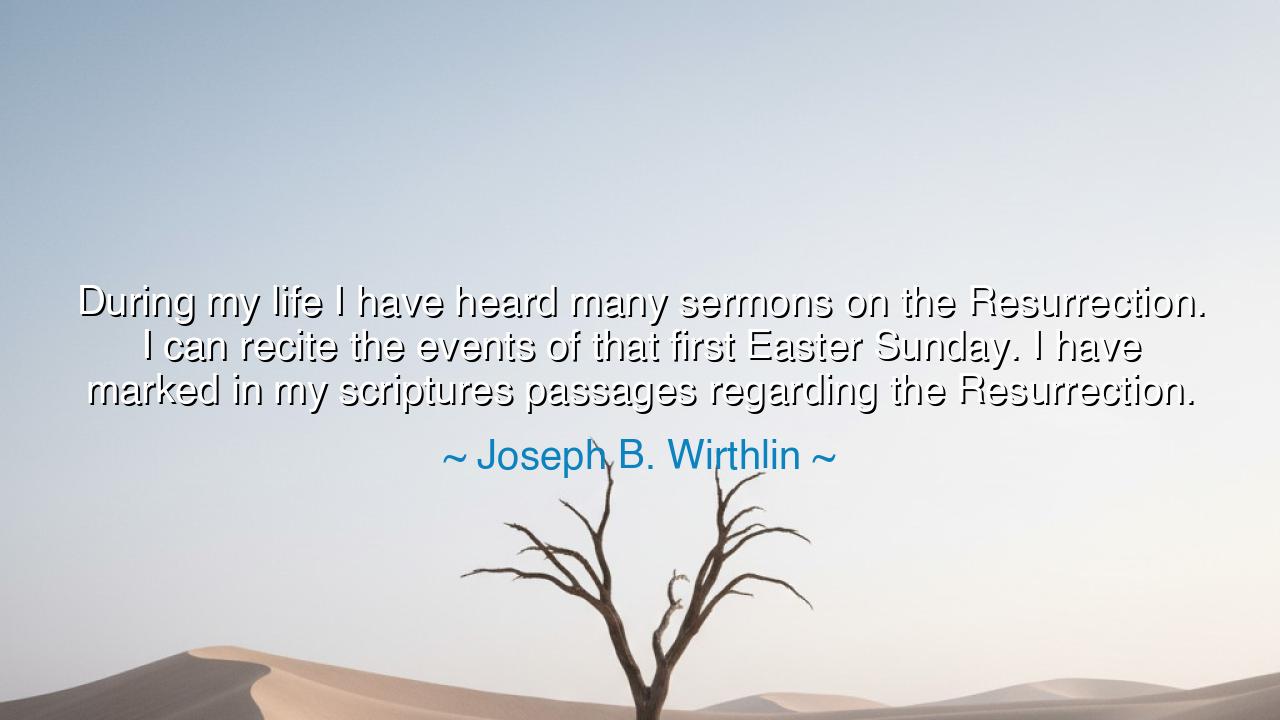
During my life I have heard many sermons on the Resurrection. I
During my life I have heard many sermons on the Resurrection. I can recite the events of that first Easter Sunday. I have marked in my scriptures passages regarding the Resurrection.






The words of Joseph B. Wirthlin — “During my life I have heard many sermons on the Resurrection. I can recite the events of that first Easter Sunday. I have marked in my scriptures passages regarding the Resurrection” — carry within them a quiet yet profound truth. It is not a declaration of knowledge, but a confession of the human heart’s eternal search for understanding beyond words. To hear, to recite, to mark — these are acts of remembrance. But to feel the Resurrection, to let its promise live within one’s soul, is something far greater. Wirthlin’s reflection reminds us that divine truths are not mastered through repetition, but through spiritual awakening. The ancient teachers knew this: the scroll may hold wisdom, but only the heart can give it life.
In the ancient world, the resurrection was not merely an event — it was a symbol of renewal, the victory of light over darkness, life over death, and hope over despair. To the early Christians, the story of that first Easter Sunday was the dawn of all new beginnings. Wirthlin, by recalling his lifelong familiarity with sermons and scriptures, reminds us of how easy it is to know the story and yet fail to live its meaning. His tone is not one of pride but of humility — the humility of one who recognizes that faith is not merely the recitation of sacred words, but the transformation of the heart that those words inspire.
Consider the story of Mary Magdalene, who stood weeping at the empty tomb. She had heard the teachings, seen the miracles, and yet in that moment of grief, she did not recognize the risen Christ until He spoke her name. It was not doctrine that revealed the truth to her, but love. In that instant, her faith moved from memory to experience. So too, Wirthlin’s words remind us that the Resurrection must not only be marked in ink upon the pages of scripture, but also written in the living testament of our daily actions — in forgiveness, in compassion, and in the courage to begin again after sorrow.
Through his reflection, Wirthlin speaks for all who have studied but not yet fully awakened, who have listened but not yet truly heard. For faith, like the seed buried in the earth, must undergo its own death before it can rise anew. The ancients understood this mystery well — that resurrection is not confined to the tomb of Christ, but repeats itself endlessly in every human life that rises from despair to hope, from failure to redemption. Every man and woman who learns to stand again after being broken becomes a living echo of Easter Sunday.
In the story of Victor Frankl, a man who endured the unspeakable horrors of a concentration camp, we see this truth reflected in mortal form. Stripped of everything — family, freedom, dignity — he found within himself a flicker of meaning that no cruelty could extinguish. From the ashes of despair, he rose again — not in body, but in spirit. His life became a testament to the resurrection of the human soul. What Wirthlin spoke of in scripture, Frankl lived in suffering: the understanding that no darkness, however deep, can conquer the light that lives within us when we believe in renewal.
To mark the scriptures is good, but to live them is divine. Every sermon heard and every passage memorized becomes but a seed; the fruit comes only when those teachings are planted in action. When we forgive those who wrong us, when we rise after grief, when we extend kindness to the brokenhearted — we partake in the living resurrection. Wirthlin’s gentle reflection calls us to move beyond hearing toward embodying, beyond belief toward transformation.
The lesson, then, is this: do not let sacred truths rest upon the pages of a book or the echo of a sermon. Let them rise within you. Let the Resurrection become the rhythm of your days — to fall and to rise, to lose and to renew, to suffer and to shine again. Each dawn that follows a night of tears is your own Easter morning.
Therefore, live as one reborn each day. Let your heart be the scripture you mark, and your life the sermon you preach. For in every act of courage, every moment of mercy, every breath that turns pain into peace — you prove that the power of the Resurrection is not only a story of the past, but the eternal song of the human spirit, ever rising, ever alive.






AAdministratorAdministrator
Welcome, honored guests. Please leave a comment, we will respond soon